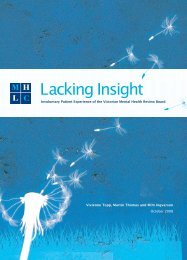Reducing Ethnic Profiling in the European Union - Open Society ...
Reducing Ethnic Profiling in the European Union - Open Society ...
Reducing Ethnic Profiling in the European Union - Open Society ...
- No tags were found...
Create successful ePaper yourself
Turn your PDF publications into a flip-book with our unique Google optimized e-Paper software.
<strong>in</strong>dividual and community confidence <strong>in</strong> polic<strong>in</strong>g.” The exercise of stop-and-searchpowers should not only be “with<strong>in</strong> <strong>the</strong> law,” but should also be demonstrably fair,effective, and <strong>in</strong>spire public confidence <strong>in</strong> <strong>the</strong> police.The report placed <strong>the</strong> onus on police forces to demonstrate through regular monitor<strong>in</strong>gthat <strong>the</strong>ir powers are be<strong>in</strong>g properly, tak<strong>in</strong>g <strong>in</strong>to account <strong>the</strong> volume ofcompla<strong>in</strong>ts; <strong>the</strong> number of f<strong>in</strong>es (fixed penalty notices), cautions, arrests and chargesaris<strong>in</strong>g from stops; <strong>the</strong> impact on crime profiles; and <strong>the</strong> level and quality of local<strong>in</strong>telligence-ga<strong>the</strong>r<strong>in</strong>g. The policy note identified several elements critical to publicconfidence, <strong>in</strong>clud<strong>in</strong>g <strong>the</strong> quality of local compla<strong>in</strong>t resolution and <strong>the</strong> will<strong>in</strong>gness of<strong>the</strong> police to provide an explanation or apology (where appropriate) and to learn fromcompla<strong>in</strong>ts. It recommended that <strong>in</strong>vestigations emerg<strong>in</strong>g from compla<strong>in</strong>ts shouldfocus on <strong>the</strong> <strong>in</strong>telligence and authorizations that led to <strong>the</strong> stops and searches, aswell as <strong>the</strong> <strong>in</strong>dividual officer’s knowledge of <strong>the</strong> powers and proper procedure, ra<strong>the</strong>rthan just on <strong>the</strong> alleged misconduct.The depth and detail of <strong>the</strong> IPCC’s <strong>in</strong>vestigations and recommendations reflectboth <strong>the</strong> longer history of concern with ethnic profil<strong>in</strong>g and <strong>the</strong> availability of ethnically-disaggregatedstatistics <strong>in</strong> <strong>the</strong> UK, which facilitate <strong>in</strong>quiries of <strong>the</strong> sort describedabove. Elsewhere <strong>in</strong> Europe, scrut<strong>in</strong>y of ethnic profil<strong>in</strong>g is less common and more challeng<strong>in</strong>g.This is due to factors <strong>in</strong>clud<strong>in</strong>g oversight bodies’ common focus on <strong>in</strong>dividualcompla<strong>in</strong>ts ra<strong>the</strong>r than patterns of law enforcement practice, <strong>the</strong> lack of ethnic data, and<strong>the</strong> challenges of prov<strong>in</strong>g discrim<strong>in</strong>ation <strong>in</strong> <strong>in</strong>dividual cases of abuse by law enforcement.<strong>Ethnic</strong> profil<strong>in</strong>g may not readily arise from <strong>in</strong>dividual compla<strong>in</strong>ts, as profil<strong>in</strong>goften <strong>in</strong>volves actions such as identity checks and stops and searches that <strong>in</strong>dividualsview as relatively rout<strong>in</strong>e annoyances and frequently do not see as serious enough towarrant <strong>the</strong> effort of mak<strong>in</strong>g a compla<strong>in</strong>t. Where compla<strong>in</strong>ts do appear to reveal patternsof ethnic profil<strong>in</strong>g, additional research may be necessary to develop a clear pictureof <strong>the</strong> prevalence and severity of allegations of ethnic profil<strong>in</strong>g.A f<strong>in</strong>al challenge lies <strong>in</strong> <strong>the</strong> substantiation of compla<strong>in</strong>ts. In compla<strong>in</strong>ts of discrim<strong>in</strong>ation,as <strong>in</strong> many o<strong>the</strong>r compla<strong>in</strong>ts of abuse, adjudication frequently must bemade on <strong>the</strong> basis of <strong>the</strong> account given by each <strong>in</strong>dividual—<strong>the</strong> officer and <strong>the</strong> civiliancompla<strong>in</strong>ant. Compla<strong>in</strong>ts <strong>in</strong>vestigations frequently f<strong>in</strong>d little or no material evidence orwitnesses and have great difficulty <strong>in</strong> f<strong>in</strong>d<strong>in</strong>g aga<strong>in</strong>st an officer’s account of <strong>the</strong> reasonfor <strong>the</strong>ir action. Such <strong>in</strong>cidents do not generally provide a reliable means of captur<strong>in</strong>gethnic profil<strong>in</strong>g practices. (This is not <strong>the</strong> case <strong>in</strong> serious abuse <strong>in</strong>cidents where <strong>the</strong>remay be medical evidence of physical abuse.) The difficulty of substantiat<strong>in</strong>g <strong>in</strong>dividualcompla<strong>in</strong>ts fur<strong>the</strong>r highlights <strong>the</strong> importance of broader <strong>in</strong>vestigations <strong>in</strong>to patterns ofpractice by oversight bodies.REDUCING ETHNIC PROFILING IN THE EUROPEAN UNION 59
















